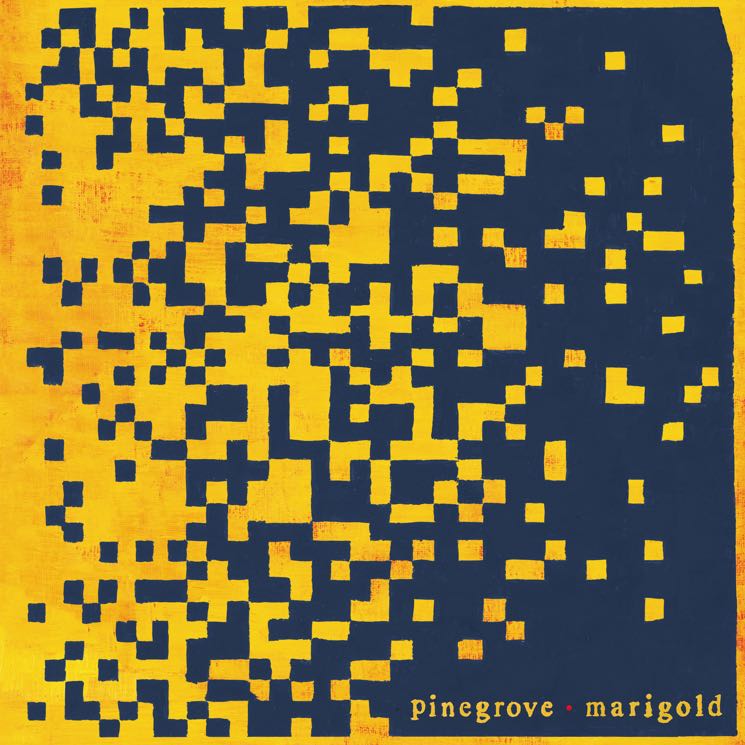The latest full-length from Montclair, NJ indie band Pinegrove comes with a giant asterisk. At the end of 2017, frontman and primary songwriter Evan Stephens Hall revealed that he had been accused of "sexual coercion" through "verbal and contextual pressure." The victim has not spoken publicly and wishes to remain anonymous, but according to Hall, they requested the band shelve their forthcoming album and take a year's public hiatus during which Hall should seek counselling, all of which Hall and the band agreed to.
Marigold, primarily written and recorded during this period, asks listeners to make some hard choices. Do you continue to support a band whose primary creative force has acknowledged their own previous sexual impropriety? Or do you "cancel" them, even as the victim has apparently given the green light to the band's activities?
It's the question of this complicated time, and Marigold is one of the first pieces of art to wrestle with these ideas, though somewhat indirectly. It's a record of choices, both the creative ones made by its contributors, and the ones we as listeners are forced to make.
Hall has cautioned against any sort of narrative or diaristic reading of the record and anyone listening to Marigold without this context — a realistic probability given how central playlists and algorithms now are to most people's listening habits — will find little to suggest that the record was born out of such circumstances. Hall continues to preaches self-reliance, community and acceptance over emo- and alt-country-tinged indie rock. Viewed in this light, Marigold is a record about self-examination: of who he is, who he wants to be the determination and perseverance it takes to get from one to the other, something most listeners can identify with.
Recorded in the front room of his and guitarist Nick Levine's house, it offers slightly improved fidelity, thanks to guitarist and co-producer Sam Skinner eschewing a live-off-the-floor sound. Properly separating the instruments, performed by band members Hall, Skinner, Levine, his brother Zack on drums, Josh Marré on bass along with Half Waif's Nandi Rose Plunkett and Hall's and the Levines' fathers, gave Hall the chance to refine his lyrical choices. Where he previously let words tumble out of him, here the songs unfold with greater purpose, the verses and choruses more defined. It is both physically rousing and emotionally moving.
Reframed in context, however, it becomes a much more personal and specific record. Lines like "I'm in this moment, and I can't see past it" or "Do I do my thing and just keep my head down?" take on new meanings, muting the record's highs and deepening its introspection. Curiously, from a band who tend to work in symbols and double meanings, whichever angle you approach the record with, it's the band's most direct effort to date.
At least in the near future, adjudicating Marigold's artistic merit will depend on the choices made by listeners. Do you engage or ignore? Take at face value or listen in context? Believe in its creator's ability to learn and become a better person or reject claims of self-improvement as virtue signalling? Marigold itself offers no clear answer and maybe that's its greatest achievement.
(Rough Trade)Marigold, primarily written and recorded during this period, asks listeners to make some hard choices. Do you continue to support a band whose primary creative force has acknowledged their own previous sexual impropriety? Or do you "cancel" them, even as the victim has apparently given the green light to the band's activities?
It's the question of this complicated time, and Marigold is one of the first pieces of art to wrestle with these ideas, though somewhat indirectly. It's a record of choices, both the creative ones made by its contributors, and the ones we as listeners are forced to make.
Hall has cautioned against any sort of narrative or diaristic reading of the record and anyone listening to Marigold without this context — a realistic probability given how central playlists and algorithms now are to most people's listening habits — will find little to suggest that the record was born out of such circumstances. Hall continues to preaches self-reliance, community and acceptance over emo- and alt-country-tinged indie rock. Viewed in this light, Marigold is a record about self-examination: of who he is, who he wants to be the determination and perseverance it takes to get from one to the other, something most listeners can identify with.
Recorded in the front room of his and guitarist Nick Levine's house, it offers slightly improved fidelity, thanks to guitarist and co-producer Sam Skinner eschewing a live-off-the-floor sound. Properly separating the instruments, performed by band members Hall, Skinner, Levine, his brother Zack on drums, Josh Marré on bass along with Half Waif's Nandi Rose Plunkett and Hall's and the Levines' fathers, gave Hall the chance to refine his lyrical choices. Where he previously let words tumble out of him, here the songs unfold with greater purpose, the verses and choruses more defined. It is both physically rousing and emotionally moving.
Reframed in context, however, it becomes a much more personal and specific record. Lines like "I'm in this moment, and I can't see past it" or "Do I do my thing and just keep my head down?" take on new meanings, muting the record's highs and deepening its introspection. Curiously, from a band who tend to work in symbols and double meanings, whichever angle you approach the record with, it's the band's most direct effort to date.
At least in the near future, adjudicating Marigold's artistic merit will depend on the choices made by listeners. Do you engage or ignore? Take at face value or listen in context? Believe in its creator's ability to learn and become a better person or reject claims of self-improvement as virtue signalling? Marigold itself offers no clear answer and maybe that's its greatest achievement.




